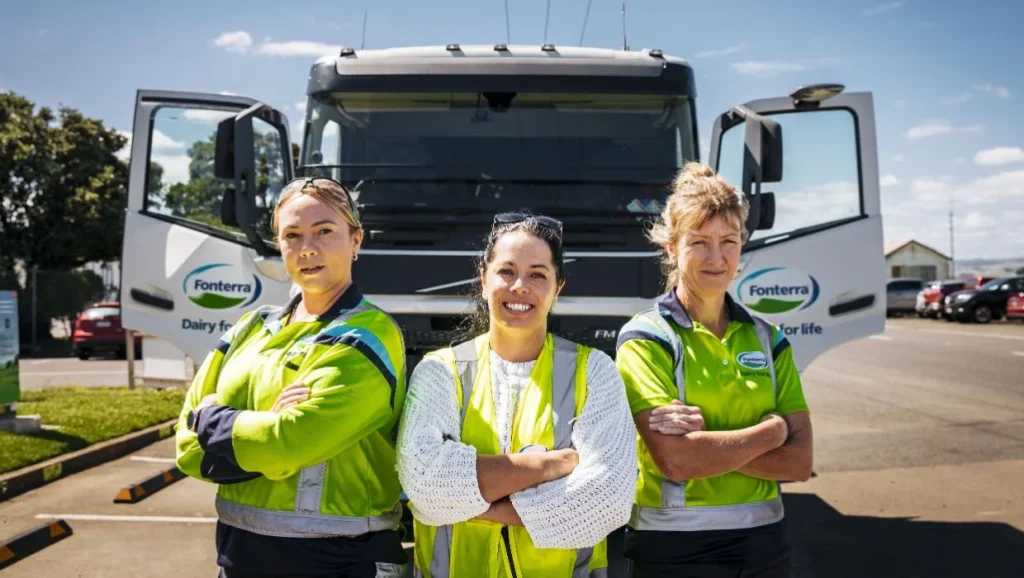When Jess McLachlan wanted to become a truck driver her son told she couldn’t because it was just for boys.


When Jess McLachlan wanted to become a truck driver her son told she couldn’t because it was just for boys.
“Just watch me,” she responded.
McLachlan, now a Taranaki-based Fonterra tanker driver, is one of the handful of women in the male-dominated role being celebrated this International Women’s Day to encourage others to give it a go.
The mum of three is one of the newest on the team, transferring to trucks after spending 11 years in the Whareroa Fonterra dairy factory near Hāwera.
“In the factory it’s very isolated whereas every day is different as a driver.
“I wish I had done it sooner.”
After getting her class 5 license, McLachlan said she begged the team to take her on and got some experience through the winter off season.
When friends see her in the driver’s seat, they can’t believe she’s driving something so big.
“It just feels like driving a car, you’re still in the same position. You forget how big it is.”
McLachlan said drivers have no idea where they’re going until they turn up to work and jump in the cab.
 All three love the job and the lifestyle it provides them.
All three love the job and the lifestyle it provides them.Driving 500km in a day is the norm travelling anywhere between Waikato and Pahiatua.
“I listen to podcasts and audio books. That keeps you going.”
McLachlan acknowledges how male-dominated the job is, but it doesn’t bother her.
Having a good sense of humour is key, she said. “You’ve got to give as good as you get. You can’t be so serious.”
Karla Jamieson joined Fonterra five years ago, and got her truck license when she was 18 years old.
She echoed McLachlan on how much she enjoyed the job, and the variety of places involved.
“The other day my truck was loaded with cream so I had to take 2500 litres of cream to Ferndale in Eltham and then bring the rest back to unload and then went down to Apiti.“
It gives her a better quality of life, she said.
“Six and three is hard yakka.
“This gives me more time to spend with my horses and bike riding.”
 While they say it is a male dominated industry, all say you’ve just got to have a sense of humour and hold your own.
While they say it is a male dominated industry, all say you’ve just got to have a sense of humour and hold your own.The key to working night shift was all about getting your routine right and making sure you got a good sleep, she said.
But if she was sitting for long periods of time, she would pull over, jump out and do a walk around the truck to stretch her legs.
Before driving for Fonterra Jamieson was dairy farming for 15 years.
“We need more women in the job, we’ve got more attention to detail.”
When Dayna Thompson, who moved from the hospitality industry to driving trucks, started in the industry, she said it was hard as a woman to find someone willing to give you experience.
It used to be an employment requirement for drivers to have a minimum 2 years class 5 experience.
Fonterra now prefer people who are natural drivers with a little experience, because they can then train them in the way they want them to drive, rather than having a driver with years of bad habits.
“We have a programme called the ‘Te Te Kura Programme’ that the depots run,” a Fonterra spokesperson said.
“It’s all about getting inexperienced drivers into the workforce,” they said.
“They take them from a class 5 L to full class 5 and looking at class 4 now too; they are bonded to Fonterra on completion but also puts drivers back into the national driver pool.”
“I think the age-old view of ‘the stay-at-home mum and the man does all the heavy machinery jobs’ mentality is running its course, because we can do it just as good as men.”
The mum-of-one worked in trucking in Brisbane before moving home to Taranaki.
“It’s not actually hard work. It’s not like we’re lifting bloody logs all day, or chucking chains over the back of loads, which is what I was doing in Brisbane.
“It’s pretty easy. Being women, we just get it done.“
Legal notice about Intellectual Property in digital contents. All information contained in these pages that is NOT owned by eDairy News and is NOT considered “public domain” by legal regulations, are registered trademarks of their respective owners and recognized by our company as such. The publication on the eDairy News website is made for the purpose of gathering information, respecting the rules contained in the Berne Convention for the Protection of Literary and Artistic Works; in Law 11.723 and other applicable rules. Any claim arising from the information contained in the eDairy News website shall be subject to the jurisdiction of the Ordinary Courts of the First Judicial District of the Province of Córdoba, Argentina, with seat in the City of Córdoba, excluding any other jurisdiction, including the Federal.
1.
2.
3.
4.
5.
eDairy News Spanish
eDairy News PORTUGUESE
